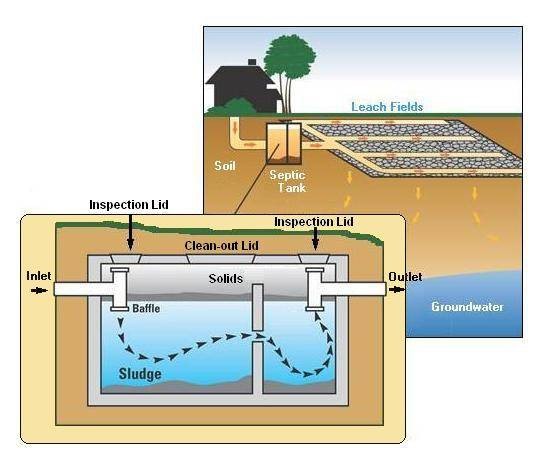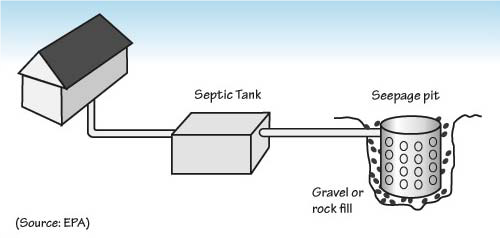Septic systems can affect the health of our lakes
Septic systems are important in our lakeside communities. A properly functioning septic system can protect the health of individuals and the environment. If you maintain your septic system, you can extend its life and protect the health of the lakes.
Think of the septic system as your home’s digestive system. Don’t overload it or kill off the good bacteria. In general, if it wouldn’t go into (or come out of) a person, it doesn’t belong in a septic system.
- Do not use garbage disposals. The increased load will require pumping the tank twice as often.
- Limit how much grease goes down the drain.
- Wash latex paint from pans and brushes under an outside hose.
- Disposing toxic household chemicals down the drain may kill beneficial biological activity.
- Commercial septic additives are not necessary and may be harmful.
- Flushing unwanted medications can destroy the biological treatment in the system, and might contaminate surface waters and groundwater. Take medications to disposal sites at the Lewisboro police station.
- Know where your septic system is located and don’t pave or drive over it, and don’t plant trees on the fields. An important part of the system is treatment of the waste by aerated soil.
Don’t overload your septic system. A lot of water arriving at once will stir up the solids, which can flow into the fields and contribute to clogging. Unsaturated soil is a necessary component of the septic treatment.
- Fix leaking fixtures. A constant drip can flood your septic system.
- Don’t drain hot tubs, footing drains, sump pumps, or water softener backwash into the septic system.
- Stagger laundry loads over several days, and defer laundry during heavy storms that saturate the soil.
- Install low-flow fixtures and use water saving appliances.
Do septic systems treat phosphorus? Not directly. The phosphorus in septic effluent will bind with dry soil. Soil particles reach capacity limits and phosphorus travels about 3 feet further each year. After a number of years, the phosphorus plume can reach groundwater or lakes, where it enables plant and algae growth. So even if a septic system is effectively treating pathogens, it can be contributing to problems in the lakes. As shown by the Waccabuc study, many of our septic systems are in poor soils, on steep slopes, or lack adequate separation from groundwater or bedrock, making them function poorly for phosphorus removal.

Typical septic systems have a septic tank and a distribution field. Septic tanks separate out the scum and sludge before discharging to the drainfield or leach field, where the waste water is dispersed. Sludge and floating scum can clog the drainfield, so it’s important to ensure that baffles are in place, and to pump before the sludge and scum layers get too thick. Older tanks may have only one compartment so it’s more important to manage water flow and not stir up sludge.
Other kinds of septic systems.

Seepage pits are installed where drainfields cannot be constructed.
Cesspools are seepage pits without septic tanks, and therefore do not have any pre-treatment of wastewater.
Holding tanks are septic tanks without drainfields, and therefore require frequent pumping to remove the wastewater as well as the sludge and scum.
Newer advanced treatment septic systems have alternate approaches but that’s a big topic.
Learn more about septic systems, impacts on lakes, and alternate systems in this comprehensive Cornell Cooperative document.
Town law requires septic pumping at least once every five years.
Maintain your system by having your septic tank cleaned regularly. It’s the best and cheapest way to keep your septic system in good working order. It’s also the law.
While Westchester County and the Town now require septic pumping and inspection at least once every five years, most tanks require pumping every two to three years to stay in good condition. Keep records so you know when your septic was pumped. When the tank is pumped, ask if the baffles that limit solids from flowing into the fields are in place, and if they are not, have the pumper repair them. Westchester County provided a map showing Lewisboro septics pumped from 2017 to 2021. Click to see when your septic was pumped.
Westchester County has grants for septic repair for income eligible residents.
What septic pumpers operate locally?
The companies that pumped at least 1% of the septics in Lewisboro in the last three years are in the table below. It shows the percent each company performed of the annual reported pump-outs in Lewisboro. Source: Westchester County GIS pump-out records.
| Septic Haulers | 2021 | 2022 | 2023 | Contact Info |
| Barnes Septic | 1% | 2% | 2% | 914 666-2570 https://www.barnessepticinc.com/ |
| C&C Septic | 2% | 1% | 2% | 913 737- 3370 https://www.facebook.com/candcseptictankservice/ |
| D. Palladino & Sons | 3% | 4% | 3% | 203 966-9349 https://www.palladinoandsonseptic.com/ |
| Fred A Cook Jr Inc | 3% | 3% | 3% | 914 685-6242 https://www.fredcook.com/ |
| Gary E Powell Enterprise | 4% | 3% | 4% | 914 242-7455 |
| Great Bear | 1% | 3% | 2% | 845 621-0250 https://mahogreatbearseptic.com/ |
| Ronnie’s Septic Service | 4% | 4% | 3% | 914 774-1952 https://ronniesseptic.com/ |
| Vogler Brothers | 46% | 45% | 44% | 914 232-5535 https://www.voglerbrothersseptic.com/ |
| Westchester Septic Tank Services | 22% | 21% | 21% | 914 232-3943 www.septic.com/septic-services/new-york/katonah/westchester-septic-service/ |
| Wind River Environmental * | 11% | 15% | 15% | 877 560-9007 https://www.wrenvironmental.com/ |
